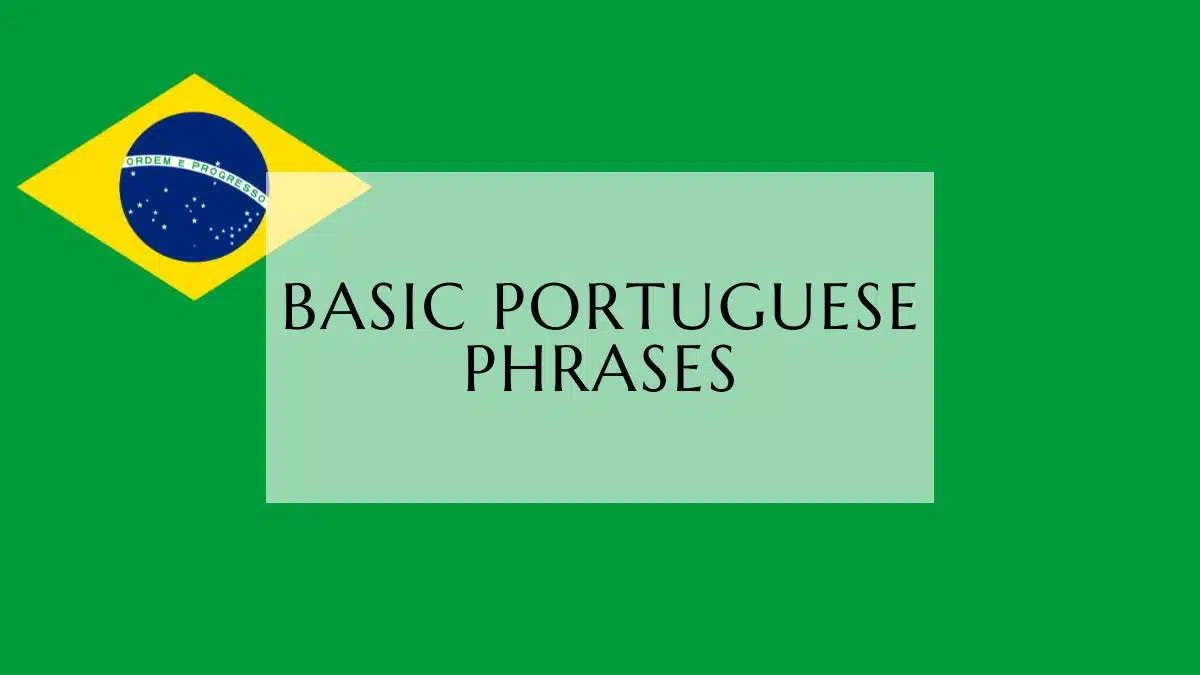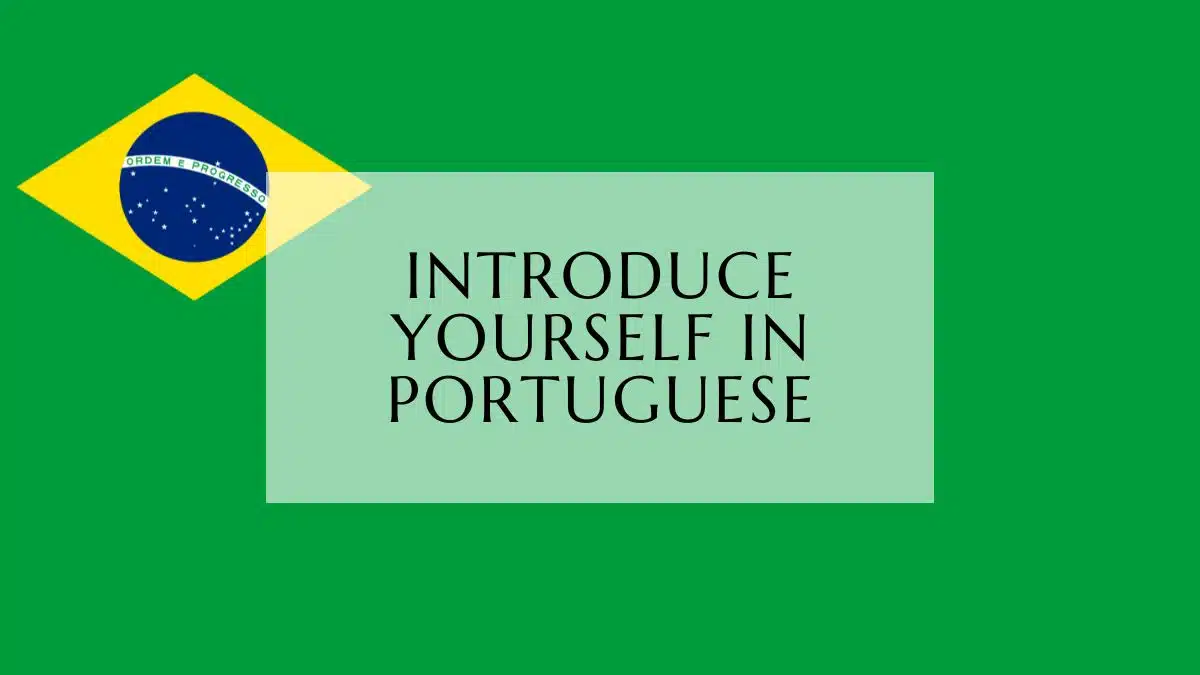In this lesson, we will talk about basic Portuguese phrases (with audio) that we use in daily life, different ways of greetings, and a set of survival phrases to get you understood. Let’s get started!

Basic Portuguese Phrases
You probably know “Olá!” and “Tudo bem??”, but Portuguese speakers don’t use only those, there are different greetings used in different situations throughout the day, learning them will expand your vocabulary and make you sound more natural while speaking.
| English | Portuguese |
| Hi | Oi/Olá! |
| Welcome | Bem-vindo |
| Good morning! | Bom dia! |
| Good evening! | Boa noite! |
| Good night! | Boa noite! |
| How are you doing? | Tudo bem? |
| How are things going? | Como vão as coisas? |
| How is everything? | Como vai tudo? |
| How is life going? | Como vai a vida? |
| Well / Very well | Bem / Muito bem |
| Bad | Mal |
| More or less | Mais ou menos |
| I am fine. | Estou bem |
| And you? | E tu? / e você? |
| Not very well, unfortunately | Não muito bem, infelizmente |
| How is the family? | Como está a família? |
| Everything is fine. | Tudo está bem |
| Thank you | Obrigado (if the speaker is a male) / obrigada (female) |
| Thank you very much | Muito obrigado/ Muito obrigada |
| You are welcome | De nada |
| What’s up? | E aí? |
| Pleasure to see you | Prazer em vê-lo |
| How’s your day? | Como está o seu dia? |
| Let’s meet tomorrow | Vamos nos encontrar amanhã |
| Bye. | Tchau! |
| Good bye | Adeus |
| See you tomorrow. | Até amanhã |
| See you | Até mais |
| See you later | Até logo |
| See you next time | Até à próxima |
Note: you can practice what you’ve learned here, and learn how to pronounce each of the words in our Memrise course here, don’t know how to use the platform or sign up? we’ve got you covered in this easy-to-follow tutorial here.
Survival Phrases
| English | Portuguese |
| What is your name? (informal) | Qual é o seu nome? |
| What is your name? (formal male) | Como o senhor se chama? |
| What is your name? (formal female) | Como a senhora se chama? |
| My name is … | Me chamo… |
| Nice to meet you | Prazer em conhecê-lo |
| The same | Igualmente |
| I’m sorry | Desculpe-me |
| Excuse me / Pardon | Com licença / Perdão. |
| Let’s go! | Vamos! |
| Yes | Sim |
| No | Não |
| Perhaps | Talvez |
| Where are you from? (informal) | De onde você é? |
| I’m from … | Eu sou de … |
| How old are you? (informal) | Quantos anos você tem? |
| I am … years old. | Eu tenho … anos. |
| Do you speak English? (informal) | Você fala inglês? |
| I don’t speak… | Eu não falo … |
| I speak… | Eu falo … |
| I speak a little Portuguese | Falo um pouco de Português |
| Just a moment please | Um momento, por favor |
| How do you say … in Portuguese? | Como se diz … em português? |
| Can you help me? | Você pode me ajudar? |
| Can you say that again? | Você pode repetir? |
| Do you understand? | Compreende? / Entende? |
| I don’t know | Eu não sei |
| I don’t understand | Eu não compreendo/entendo |
| Of course | Claro que sim |
| What does it mean … ? | O que significa … ? |
| What? | Como? |
| Here. | Aqui |
| What is that? | O que é isto? |
| What’s the matter? | Qual é o problema? |
| It doesn’t matter | Não importa |
| What’s happening? | O que aconteceu? |
| I have no idea | Não tenho idéia |
| I’m tired | Estou cansado/cansada |
| I’m sick | Estou doente |
| I’m hungry | Estou com fome |
| I’m thirsty | Estou com sêde |
| I’m hot | Estou com calor |
| I’m cold | Estou com frio |
| Bless you! | Saúde! |
| Congratulations! | Parabéns! |
| Don’t worry | Não se preocupe. |
| Good luck! | Boa sorte! |
| I must go now | Tenho que ir agora |
| That’s alright. | Tudo bem |

Basic Portuguese Phrases Study Guide
Quiz
Instructions: Answer the following questions in 2-3 sentences.
- Explain the difference between “Olá” and “Bom dia” when greeting someone in Portuguese.
- How would you ask someone “What is your name?” in both formal and informal settings?
- Provide the Portuguese phrases for “Good evening,” “Good night,” and explain if they differ in usage.
- You want to ask someone, “How are you?” in Portuguese. List two different phrases you could use.
- How do you say “Thank you” in Portuguese, and how does the gender of the speaker affect the phrase?
- What are two ways to say “Goodbye” in Portuguese?
- You’ve forgotten something and need a moment. How do you politely ask for “Just a moment, please” in Portuguese?
- Translate the following phrase into Portuguese: “Excuse me, I don’t speak Portuguese very well.”
- You need help understanding something. How can you ask “What does it mean?” in Portuguese?
- List three phrases from the “Survival Phrases” section that you think would be most useful in a basic conversation and explain why.
Short Answer Quiz: Answer Key
- “Olá” is a general greeting, similar to “Hi” in English, used at any time of day. “Bom dia” specifically means “Good morning” and is used until noon.
- Informally, you would ask, “Qual é o seu nome?”. Formally, you would ask a man “Como o senhor se chama?” and a woman “Como a senhora se chama?”.
- Both “Good evening” and “Good night” in Portuguese are “Boa noite.” The phrase serves as a greeting in the evening and a farewell at night.
- Two ways to ask “How are you” are “Tudo bem?” and “Como vão as coisas?”.
- “Thank you” in Portuguese is “Obrigado” if the speaker is male and “Obrigada” if the speaker is female.
- Two ways to say “Goodbye” are “Tchau” (informal) and “Adeus” (more formal).
- The phrase for “Just a moment, please” is “Um momento, por favor.”
- “Excuse me, I don’t speak Portuguese very well” translates to “Com licença, eu não falo português muito bem.”
- “What does it mean?” in Portuguese is “O que significa…?”
- (Answers may vary) Useful phrases could include “Can you help me?” (“Você pode me ajudar?”), “I don’t understand” (“Eu não compreendo/entendo”), and “How do you say… in Portuguese?” (“Como se diz… em português?”). These phrases are essential for seeking assistance and clarifying meaning during basic interactions.
Happy learning!
Oualid Cheddadi is the founder of Lingualid, a platform that inspires independent language learners worldwide, regardless of the language they are learning. The name “Lingualid” is derived from the Portuguese word for “language,” “língua,” and the last three letters of Oualid’s name, “Lid.”



